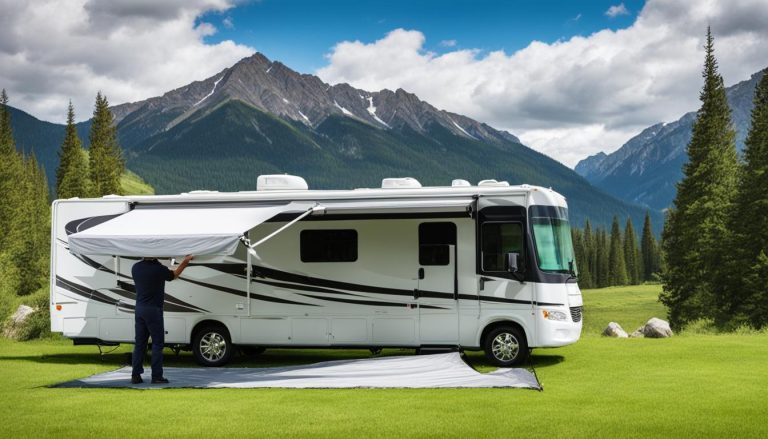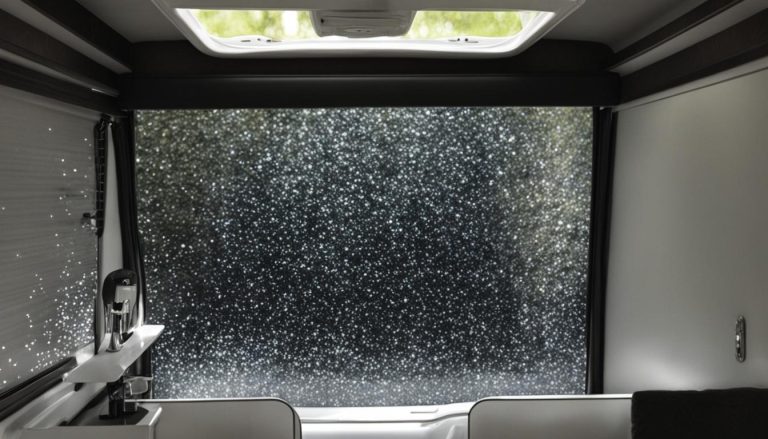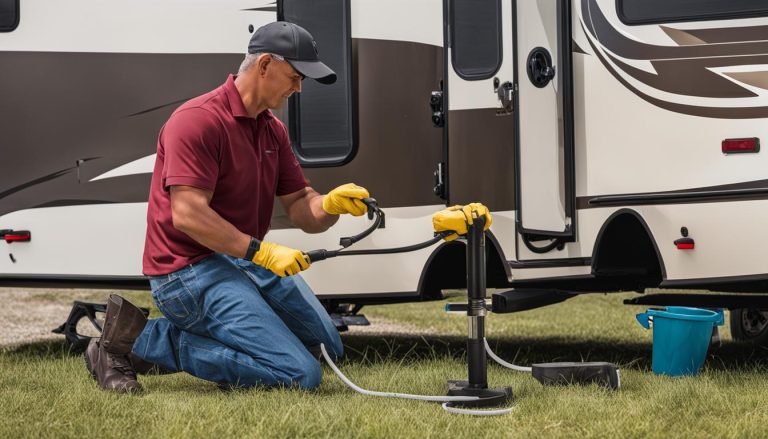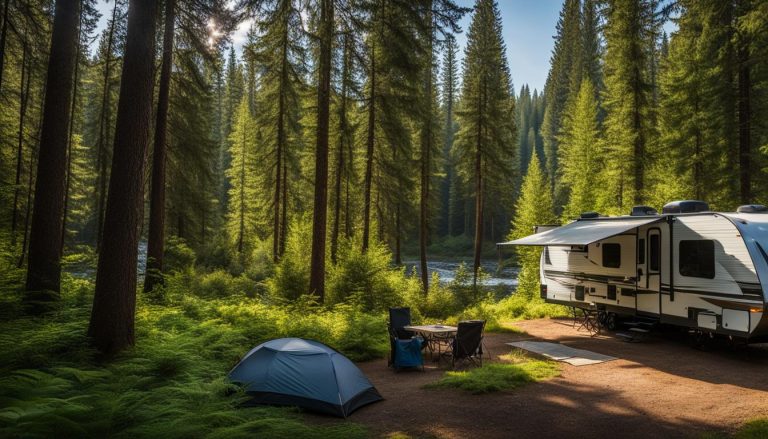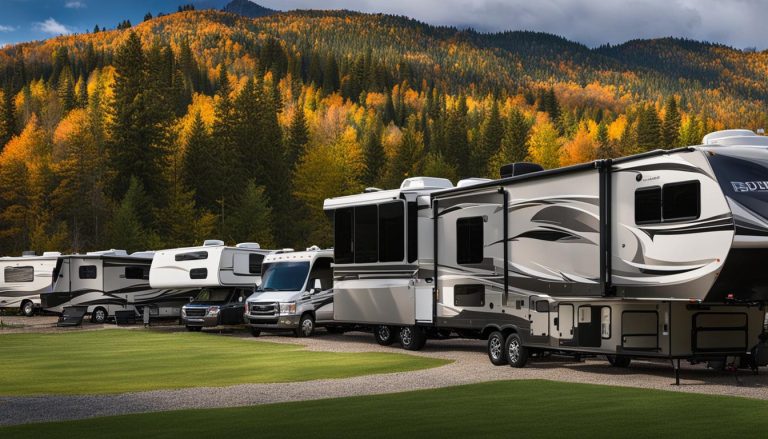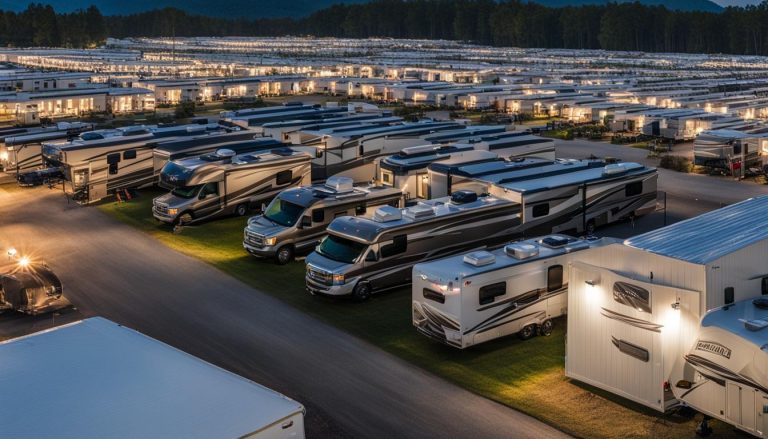Full-Time RV Living Guide & Tips
gorvlifestyle.com and its partners may earn a commission if you purchase a product through one of our links
Are you curious about how to live in an RV full-time? Or maybe you’re considering embarking on a full-time RV living adventure? Look no further! This comprehensive guide is designed to provide you with essential tips and insights for a successful and rewarding RV lifestyle.
Living in an RV full-time offers a unique and exciting way to experience the world around you. From the freedom of travel and flexibility to the close connection with nature and the vibrant RV community, there are countless advantages to embracing this lifestyle. However, it’s also important to be aware of the potential challenges that come with it. From limited living space to maintenance and logistics, full-time RV living requires careful planning and adaptation.
In this guide, we’ll delve into the costs of RV living, including RV park fees, maintenance, insurance, and more. We’ll explore the advantages and challenges of full-time RV living, giving you a complete understanding of what to expect. You’ll also find valuable tips for beginners, covering everything from budgeting and research to community building and travel planning.
So, whether you’re a seasoned RVer or just starting out, this guide will equip you with the knowledge you need to make the most of your full-time RV living experience. Let’s dive in and discover the wonders and possibilities that await you on the open road!
Key Takeaways
- Living in an RV full-time offers the freedom to travel and explore new places, with the flexibility to change locations whenever desired.
- RV living provides a close connection with nature, allowing you to camp in beautiful scenic locations.
- The RV community is known for its strong sense of camaraderie and support, creating a unique social experience on the road.
- Full-time RV living comes with its own set of challenges, such as limited living space, frequent maintenance, and logistics management.
- Creating a realistic budget, conducting thorough research, building a community, and staying on top of regular maintenance are key factors for successful full-time RV living.
RV Living Costs: What to Consider
Living in an RV full-time comes with its own set of costs. It’s important to understand and plan for these expenses to ensure a smooth and financially sustainable RV living experience.
Purchasing or Financing an RV
One of the major expenses to consider is the cost of buying or financing an RV. The price range varies depending on the type of RV, brand, age, and condition. Researching and comparing different options will help you find the RV that suits your needs and budget.
RV Park Fees
If you plan to stay in RV parks frequently, it’s essential to factor in RV park fees. These fees can vary widely depending on the location, amenities, and duration of your stay. Researching different RV parks and their associated fees will help you determine the average cost of accommodation.
Utility Costs
Utility costs are another important consideration. RVs require water, sewer, and electricity hookups. It’s crucial to budget for these expenses, which can vary depending on your location and usage.
RV Maintenance and Repairs
Maintaining and repairing your RV is an ongoing cost. Regular maintenance, such as oil changes, tire rotations, and inspections, will help keep your RV in good condition. It’s wise to set aside funds for unexpected repairs and to consider purchasing an extended warranty for added peace of mind.
RV Insurance
RV insurance is essential to protect your investment. The cost of insurance can vary based on factors such as the value of your RV, your driving history, and the coverage options you choose. Comparing insurance quotes from multiple providers will help you find the most suitable and affordable coverage.
Roadside Assistance
Having roadside assistance coverage is highly recommended for RVers. It provides peace of mind in case of breakdowns or emergencies on the road. Consider including this expense in your budget to ensure you have the necessary help when needed.
Fuel Costs
Traveling in an RV involves fuel costs. The mileage of your RV, the distance you plan to travel, and fluctuating fuel prices can impact your budget. It’s a good idea to estimate fuel expenses based on the expected mileage and current fuel prices to create an accurate budget.
Additional Expenses
Aside from the basic costs mentioned above, there are other miscellaneous expenses to consider. These include expenses for activities, groceries, eating out, internet access, laundry, and entertainment. Creating a detailed budget that covers these additional expenses will help you manage your finances effectively.
By considering all these costs and creating a comprehensive budget, you’ll be better prepared to live comfortably and enjoy your full-time RV lifestyle.
| Expense | Estimated Cost |
|---|---|
| Purchasing or Financing an RV | $XX,XXX – $XXX,XXX |
| RV Park Fees | $X – $XX per night |
| Utility Costs | $XX – $XXX per month |
| RV Maintenance and Repairs | Varies based on needs and condition |
| RV Insurance | Varies based on coverage |
| Roadside Assistance | $X – $XX per year |
| Fuel Costs | Varies based on mileage and fuel prices |
| Additional Expenses | Varies based on individual preferences |
Advantages of Full-Time RV Living
Living in an RV full-time comes with a multitude of advantages that make it an appealing lifestyle choice. If you’re considering this adventurous way of living, here are some key advantages to keep in mind:
1. Freedom of Travel
One of the greatest advantages of full-time RV living is the absolute freedom it offers. You have the ability to travel wherever you want, whenever you want. With your home on wheels, you can explore new destinations and embark on exciting adventures without the constraints of a traditional home.
2. Flexibility
RV living provides unparalleled flexibility. You have the power to change your location as often as you desire. Whether you want to spend a few days in a bustling city or immerse yourself in the tranquility of nature, you have the agility to tailor your travel plans to suit your preferences. Flexibility is truly at the core of the RV lifestyle.
3. Community
The RV community is renowned for its strong sense of camaraderie and support. When you live in an RV full-time, you become part of a vibrant community of like-minded individuals who share a love for travel and adventure. You’ll have the opportunity to meet new people, forge lifelong friendships, and create lasting memories together.
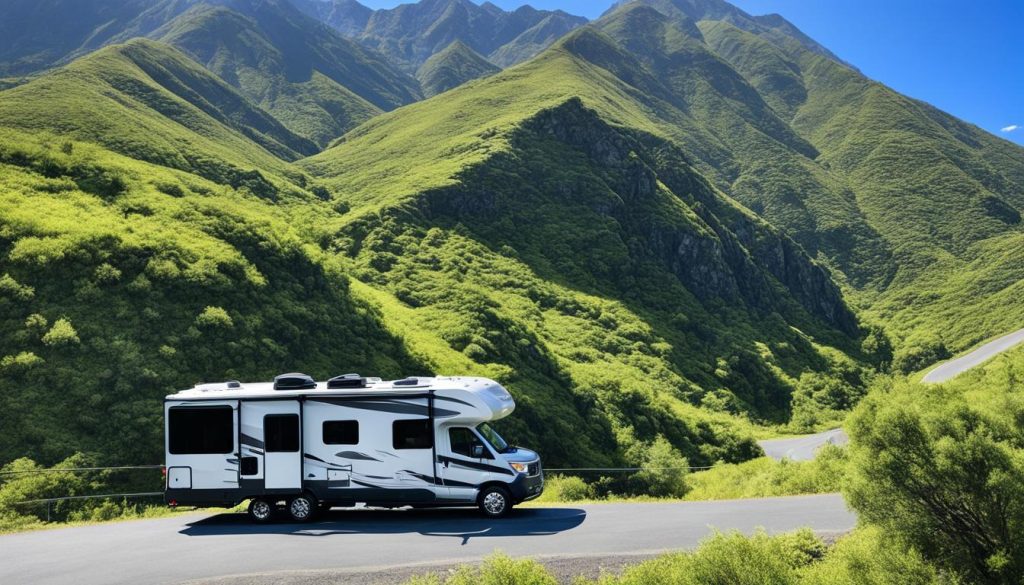
4. Connection with Nature
Another cherished advantage of full-time RV living is the opportunity to immerse yourself in the beauty of nature. With the freedom to camp in picturesque locations, you can wake up to breathtaking views, explore stunning hiking trails, and experience the serenity of the great outdoors. Nature becomes your backyard, opening doors to endless adventures.
As you can see, full-time RV living provides a host of advantages that cater to the free-spirited and adventurous souls. With the freedom to travel, flexibility in your lifestyle, the community of fellow RVers, and the incredible connection with nature, the RV lifestyle offers a unique and fulfilling way of living.
Challenges of Full-Time RV Living
While full-time RV living can be an exciting and adventurous lifestyle, it also comes with its fair share of challenges. It’s important to be aware of these challenges and find ways to overcome them in order to make the most out of your RV living experience.
1. Limited Space
One of the main challenges of full-time RV living is the limited space available. RVs are compact and designed to maximize efficiency, but it still requires careful organization and downsizing of possessions. You’ll need to prioritize essential items and find creative storage solutions to make the most of your living space.
2. Maintenance and Repairs
Another challenge is the maintenance and repairs that come with owning an RV. Compared to traditional homes, RVs require more frequent upkeep and repairs. It’s important to stay on top of regular maintenance tasks, such as checking for leaks, servicing the engine, and maintaining the electrical and plumbing systems. This can be both time-consuming and costly, so it’s essential to budget for these expenses.
3. Logistics
Managing logistics can be challenging while living on the road. Tasks such as mail forwarding, finding reliable internet access, and navigating unfamiliar locations can be more complicated compared to living in a traditional home. However, with careful planning and research, you can find solutions to these challenges. There are mail forwarding services available and various internet options like mobile hotspots that can help you stay connected.
4. Loneliness and Isolation
Living on the road can sometimes lead to feelings of loneliness or isolation, especially if you’re not part of a supportive RV community. While RV parks and campgrounds offer opportunities to connect with other RVers, it’s essential to make an effort to build a community and socialize. Joining RV clubs or online forums, attending RV-related events, and engaging in outdoor activities can help combat feelings of loneliness and create new connections.
“The challenges of full-time RV living can be overcome with careful planning, resourcefulness, and a positive mindset. It’s important to embrace the adventure while also finding solutions to the unique obstacles that may arise.”
Tips for Successful Full-Time RV Living
To have a successful full-time RV living experience, it’s important to follow certain tips. These tips include:
1. Create a Realistic Budget
When transitioning to full-time RV living, it’s crucial to have a thorough understanding of your financial situation. Create a budget that includes all expenses such as RV maintenance, fuel costs, campground fees, groceries, and entertainment. Tracking expenses will help you stay within your budget and ensure a sustainable lifestyle on the road.
2. Conduct Thorough Research
Before purchasing an RV and choosing RV parks, do thorough research. Consider factors like the type and size of the RV that suits your needs, amenities offered by RV parks, and their locations. Researching thoroughly will help you make informed decisions and enhance your overall RV living experience.
3. Build a Community of Fellow RVers
One of the best aspects of full-time RV living is the opportunity to build a strong community of fellow RVers. Connect with other RVers through online forums, social media groups, or by attending RV gatherings and events. Building a community will provide support, advice, and friendship on your RV journey.
4. Carefully Plan Travel Routes and Destinations
When planning your travel routes and destinations, consider accessibility, amenities, and attractions. Use travel planning resources and apps to find RV-friendly routes and campgrounds. Planning ahead will help you make the most of your travel experiences and avoid any unforeseen challenges along the way.
5. Stay on Top of Regular RV Maintenance and Repairs
Maintaining your RV is key to ensuring a smooth and enjoyable full-time RV living experience. Regularly inspect and maintain your RV’s mechanical systems, appliances, and exterior. Addressing any repairs promptly will help prevent major issues and keep your RV in top shape.
| Tips for Successful Full-Time RV Living | Key Takeaways |
|---|---|
| Create a Realistic Budget | Track expenses to manage finances effectively. |
| Conduct Thorough Research | Make informed decisions about the RV and RV parks. |
| Build a Community of Fellow RVers | Find support, advice, and friendship on the road. |
| Carefully Plan Travel Routes and Destinations | Maximize travel experiences and avoid challenges. |
| Stay on Top of Regular RV Maintenance and Repairs | Prevent major issues and keep the RV in top shape. |
By following these tips, you’ll be well-prepared to embrace the full-time RV living lifestyle and create remarkable memories on the road.
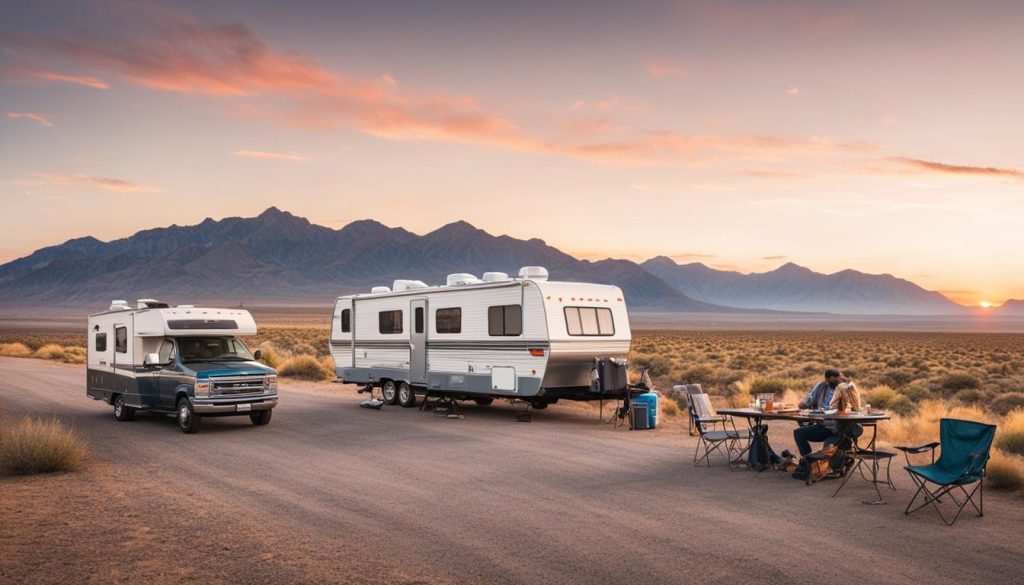
Embracing the Full-Time RV Lifestyle
Embracing the full-time RV lifestyle involves more than just living in an RV. It requires adopting a particular mindset that allows you to fully enjoy and make the most out of this unique way of life.
One important aspect of embracing the RV lifestyle is being open to work opportunities that accommodate remote work or jobs related to the RV community. With advancements in technology, many professionals now have the freedom to work from anywhere, making it easier to sustain a full-time RV lifestyle while still earning an income.
Additionally, embracing the RV lifestyle means embracing downsizing and living with less. Moving into an RV requires carefully evaluating your possessions and letting go of unnecessary items. This downsizing process not only frees up space, but it also allows you to focus on what truly matters and appreciate the experiences that the RV lifestyle offers.
Another key aspect of embracing the RV lifestyle is adopting a travel-oriented mindset. Full-time RV living provides the opportunity to explore new places, immerse yourself in different cultures, and connect with nature. By having a mindset that values the journey and the destinations, you can fully embrace the adventures and experiences that come with RV living.
Ultimately, embracing the full-time RV lifestyle is about prioritizing experiences over material possessions. It’s about cherishing the memories you create, the connections you make, and the moments of awe and wonder that traveling in an RV offers. By embracing this lifestyle and its unique opportunities, you can truly embrace the joy of RV living and create a life filled with unforgettable experiences.
FAQ
How much does it cost to live in an RV full-time?
The cost of living in an RV full-time includes expenses like buying or financing an RV, RV park fees, utility costs, maintenance and repairs, insurance, fuel, groceries, and entertainment. Creating a detailed budget is important to understand and plan for these costs.
What are the advantages of living in an RV full-time?
Living in an RV full-time offers the freedom to travel and explore new places, flexibility to change locations, a close connection with nature, and a supportive RV community that creates a unique social experience on the road.
What challenges might I face while living in an RV full-time?
Some challenges of full-time RV living include limited living space, frequent maintenance and repairs, managing logistics like mail forwarding and internet access, and potential feelings of loneliness or isolation.
What tips can you provide for successful full-time RV living?
Tips for successful full-time RV living include creating a realistic budget, conducting thorough research before purchasing an RV and choosing RV parks, building a community of fellow RVers, planning travel routes and destinations, and staying on top of regular maintenance and repairs.
How can I embrace the full-time RV lifestyle?
Embracing the full-time RV lifestyle involves seeking work opportunities that allow for remote work or are related to the RV lifestyle, adopting a downsized living mindset, embracing a travel-oriented mindset, and prioritizing experiences over material possessions.

